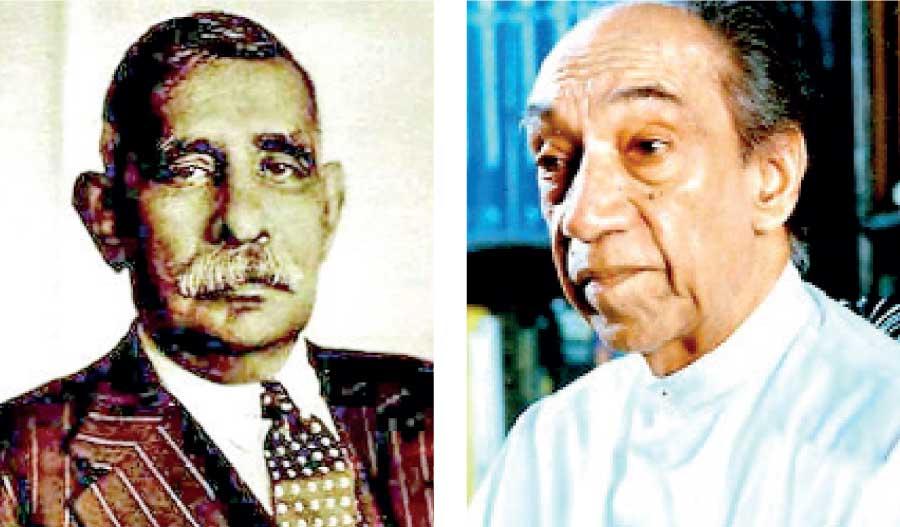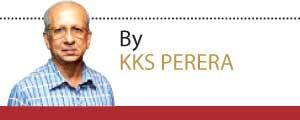Reply To:
Name - Reply Comment

On September 17, 1951; 70 yrs ago, [date coincided with JR’s 45th birthday], the New York Times covered the proceedings of the Japanese Peace Treaty Conference with a headline which read, “Voice of free Asia, eloquent, melancholy and still strong with the tilt of an Oxford accent, dominated the Japanese peace treaty conference today.” USA, the prime mover of the treaty, was keen to get our Prime Minister, DS Senanayake, to lead the delegation. However, DS had other ideas; he wanted his well-read Finance Minister, Junius Richard Jayewardene to lead instead. He even presented a cabinet paper emphasizing the fact that, “We should ask for no reparations; and we should insist that Japan should recover her freedom.” - Men and memories- JR’s Autobiography
proceedings of the Japanese Peace Treaty Conference with a headline which read, “Voice of free Asia, eloquent, melancholy and still strong with the tilt of an Oxford accent, dominated the Japanese peace treaty conference today.” USA, the prime mover of the treaty, was keen to get our Prime Minister, DS Senanayake, to lead the delegation. However, DS had other ideas; he wanted his well-read Finance Minister, Junius Richard Jayewardene to lead instead. He even presented a cabinet paper emphasizing the fact that, “We should ask for no reparations; and we should insist that Japan should recover her freedom.” - Men and memories- JR’s Autobiography
SL’s ‘Freedom for Japan’ was DS’s idea; presented by JR
‘The Treaty of Peace’ with Japan, was signed on behalf of the United Nations, by 49 nations, in September 1951, in San Francisco, California, US, establishing peaceful relations between the Allied Powers and Japan. Only three member states of the Soviet bloc refused to sign. Italy and China were not invited. The treaty became effective from April 28, 1952, legally ending the Allied occupation of Japan and offering full sovereignty to them.
Russia wanted restrictions imposed on the right of Japan to maintain a defence force. JR said, “On the question of the freedom of Japan, we agree ultimately and the treaty embodies that agreement. On the other matters, there were sharp differences of views and the treaty represents the majority views. If we do not sign this treaty, none of these eventualities can take place.” He added; thus informing the conference of the Island’s refusal, even to acknowledge the payment of compensation that would hurt Japan’s economy.
“We believe in the expressions of the Buddha whose message has influenced the innumerable lives of people in Asia, that “hatred ceases not by hatred, but by love,” the message of the Great Teacher, which spread through South Asia, and also northwards through the Himalayas into Tibet, China and finally, Japan, which bound us together for hundreds of years with a common tradition, culture and heritage.” JR [Christian converted to Buddhism at a very young age], spoke in the morning, quoting Gautama Buddha in defence of a free Japan. He did amaze the delegates in the evening with his dazzling voice singing Christmas carols, ‘Silent Night’ and ‘O come, all ye faithful, …’, the combination created a sound that got infused in the memories of generations of the Japanese populace.
Quoting foreign correspondent HBW Abeynaike, who covered JRs epoch-making speech from San Francisco, Roshan Peiris wrote in the Sunday Times of Nov. 17, 1996: ‘Women mobbed J.R. Jayewardene in the streets during the San Francisco Peace Conference seeking his autograph and though he obliged them as far as possible in his own inimitable way. ‘Jayewardene’s skill in expressing his ideas in rational verbal form, received praise: The San Francisco News, said, “A dapper, diminutive Ceylonese with a David-like gift for throwing verbal stones, stole the show at the plenary session.
There is a clarion call today for a DS-JR combine to meet the challenges the nation is facing! [Perhaps a pre-1977 JR]
Pfizer vaccine to Hambantota
The vaccination drive is in progress throughout the island, successfully. In the meantime, more top professional medical specialists, Dr. Ananda Wijewickrama and Dr. Ashoka Gunaratne have decided to resign from the ‘Intercollegiate Technical Committee’ [ITC] of the Director General of Health Services. [Earlier Prof. Neelika Malavige and another specialist had vacated the committee.] What prompted the controversial decisions? Were they due to the political interference/decisions by political authority to give priority to the 20-30 year group with the Pfizer jab in Ruhunu Giruwapaththuwa, their home base; disregarding the most vulnerable categories and thereby upsetting the master programme? Or ignoring ‘Professional’ observations and recommendations; resulting in arbitrary decisions being taken. The words of medical specialists on the national vaccination drive should be listened to by non medical politicos, and no effort should be made to ignore them in giving preference to their political agendas. Keep politics and bureaucracy apart.
The steps taken by the learned specialists no doubt, is an eye-opener that has aroused the attention of the public. It reminds me though, one of my six year-old granddaughter-twins; who, while on a disagreement on the design of their sand castle, abruptly kicks the half constructed structure and runs away to make a complaint!
‘Who Flew out of Backdoor/Window’ in Hambantota Fiasco?
‘When Pfizer flies out of the backdoor, professionals exit thro’ the window’ – [paraphrasing an old ‘Valentine saying’ to suit last week’s ITC scenario], let’s take a look at how Leonard Woolf, the Assistant Government Agent, Hambantota, in the first decade of the 20th Century, in his path-breaking first novel set in Ceylon, titled ‘The Village in the Jungle’, introduced the people in the rudimentary, primitive settlement in the deep south of Giruwapaththuwa, “ …the black and brown fellows who don’t even know they’re part of an Empire, but who just survive day by day, hand to mouth, as slash-and-burn agriculturalists; they were wild hunters”. The descendants of Silindu’s, Punchi Menika’s and Hinnihami’s, [of ‘Beddegama’ fame in Woolf’s colonial memoire] in spite of being nurtured by the ruling family’s ancestors for generations; in April 1971, five decades ago, were motivated, by the slogan, “Colombata Kiri –Gamata Kekiri”, meaning, ‘our milk [Curd] to the affluent in the city leaving only the cucumber to us]’ to take up arms against state [Gal kattas & hand made bombs].
The Conference Halls, Cricket stadia and Airports being proved ‘white elephants’; the politicians should realize that there are five other backward districts, that needs preferential treatment in the dry zones in North and East as well.
Professional Bureaucracy Vs Political Hypocrisy?
Do politicians constitute a profession?’ It is claimed that the relationship between politicians and public officials, is the basis for understanding the governing procedure, but this has been highly debated. In order to get a thorough understanding of the complex relations between politicians and public officials, it is necessary to pay attention to the two groups’ behavioral patterns. It can be argued that politicians are driven by a particular set of their own (often biased) rules and agendas, while professionals are influenced in reaching decisions, through carefully considered known facts. These two opposites create a disharmony between the two players. The division between Politicians and Professionals is more complex and their relations and functions, more diverse than can be easily explained. Strict separation of political agendas and the professional approach proves extremely difficult.
Good understanding however is a tough task with politicians!
Writer can be contacted at - [email protected]